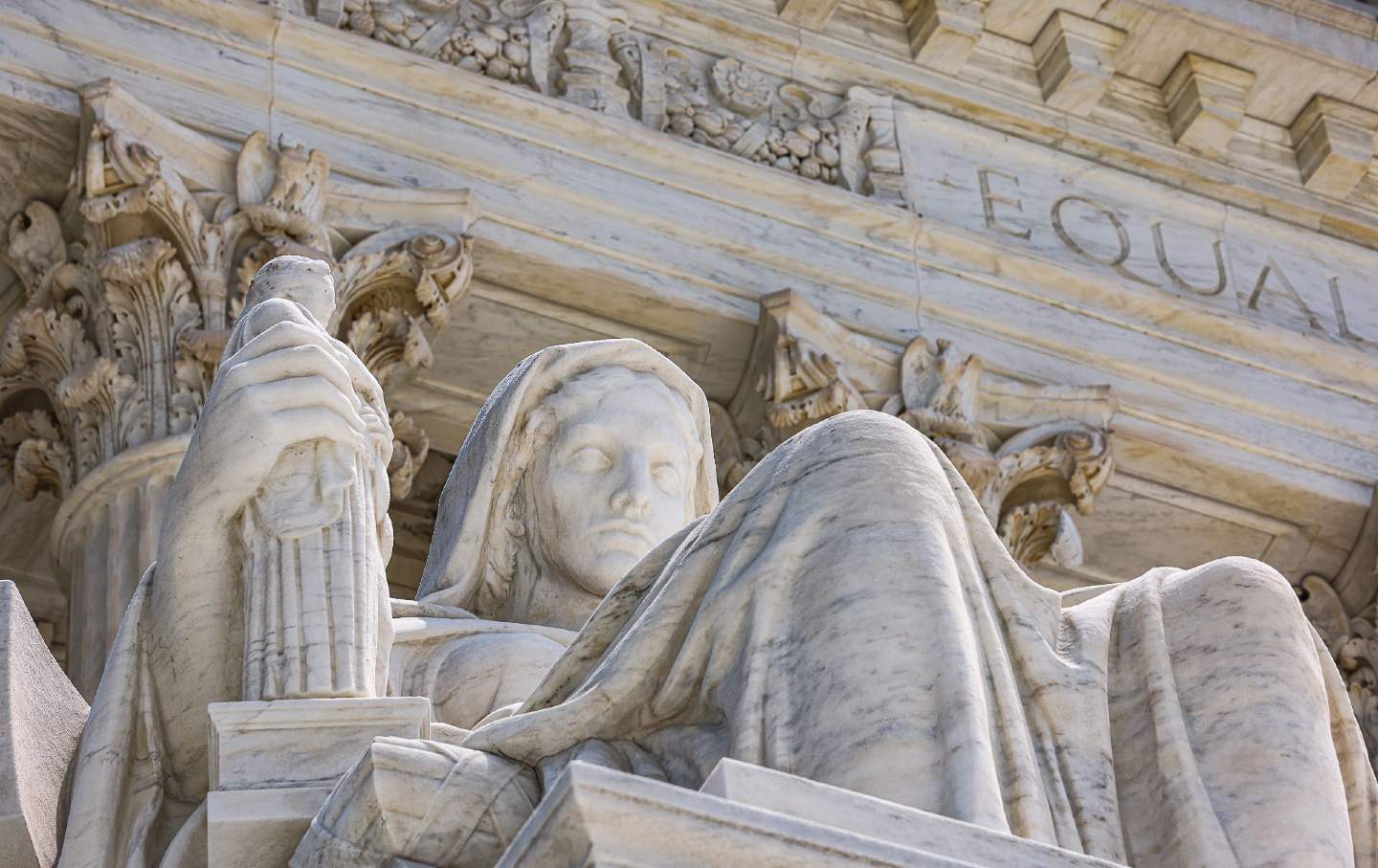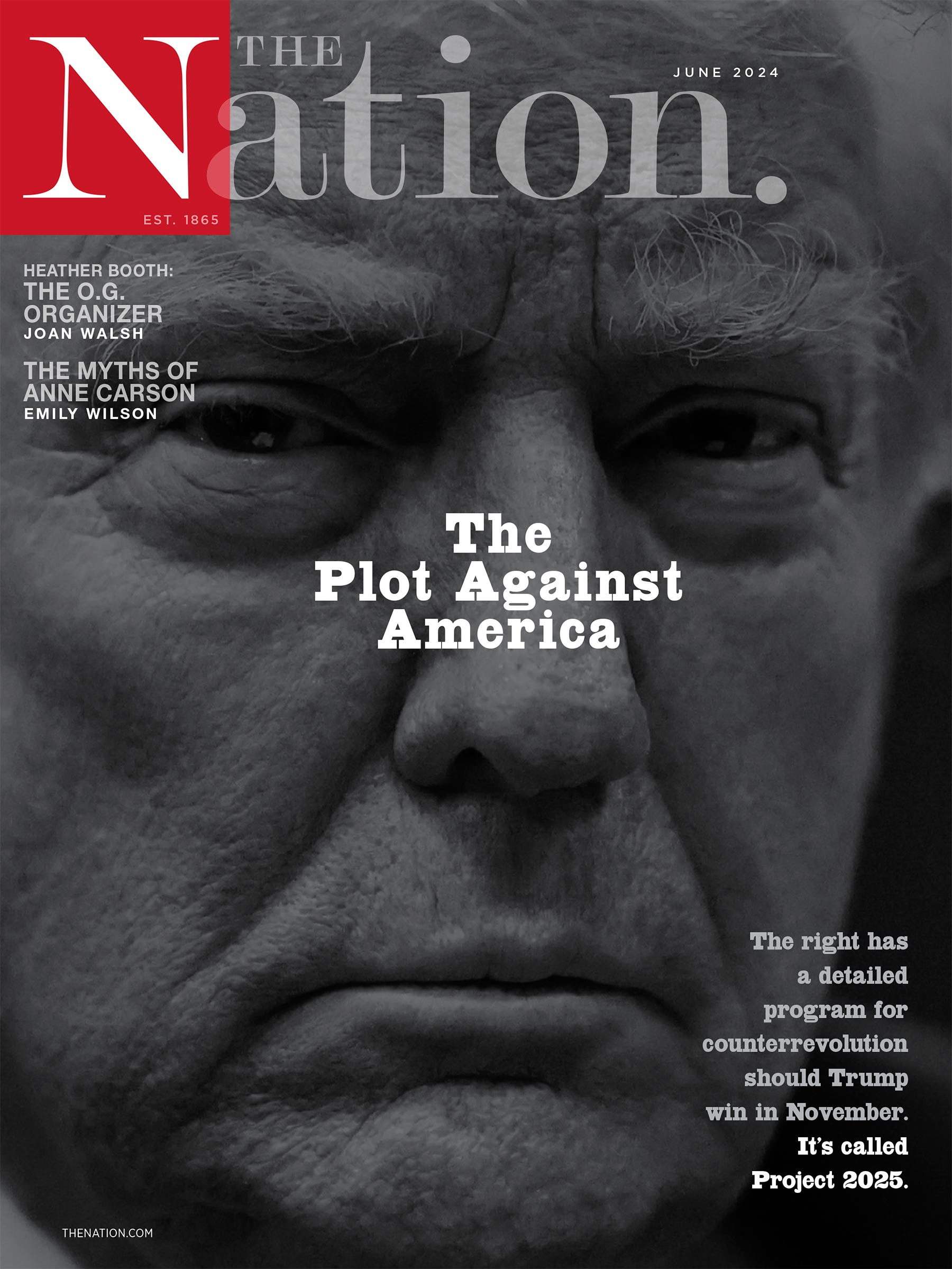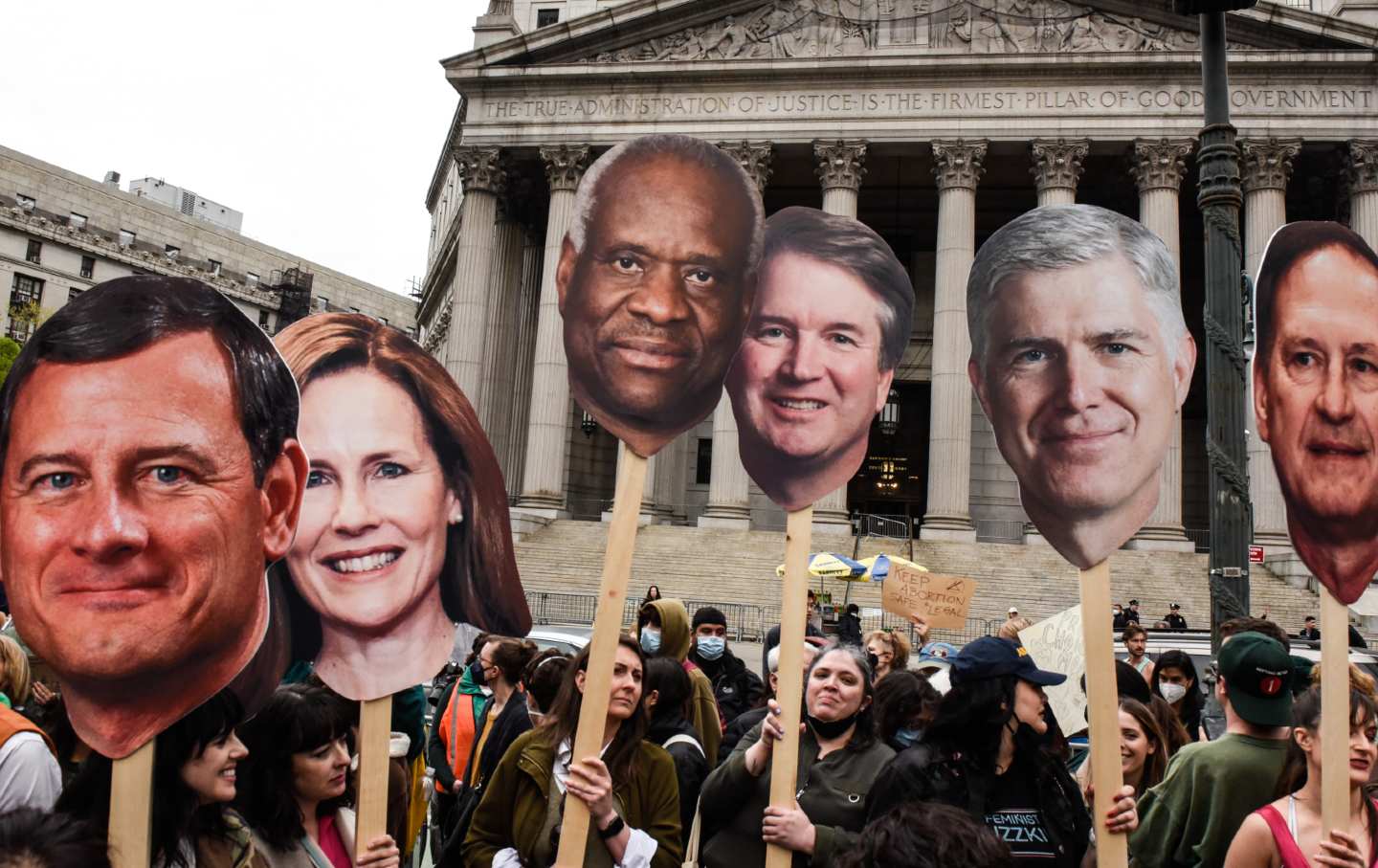The courtroom has given itself almost limitless energy over the executive state, placing every little thing from environmental protections to employees’ rights in danger.

The US Supreme Courtroom Constructing in Washington, DC.
(Valerie Plesch / Bloomberg through Getty Photos)
Within the largest judicial energy seize since 1803, the Supreme Courtroom at this time overruled Chevron v. Natural Resources Defense Council, a 1984 case that instructed the judiciary to defer to the president and the president’s specialists in government businesses when figuring out how finest to implement legal guidelines handed by Congress. In so doing, the courtroom gave itself almost limitless energy over the executive state and its regulatory businesses.
Now, in case you’re not a lawyer, that in all probability sounds dangerous, however primarily in a technical sense. Regulatory businesses just like the Environmental Safety Company and the Securities and Change Fee difficulty influential however deeply difficult guidelines, so it is smart that any individual ought to have ultimate authority over whether or not and implement these guidelines. Since we now have already made the disastrous determination to permit the Supreme Courtroom to inform us who will get to be president and what girls could be pressured to do with their our bodies, it may not sound like that large of a leap to additionally let the courtroom determine how a lot lead can leak into our ingesting water or which predators are allowed to promote mortgages.
The factor is: The US Structure, flawed although it’s, has already answered the query of who will get to determine implement our legal guidelines. The Structure says, fairly clearly, that Congress passes legal guidelines and the president enforces them. The Supreme Courtroom, constitutionally talking, has no function in figuring out whether or not Congress was proper to move the legislation, or if the manager department is true to implement it, or how presidents ought to use the authority granted to them by Congress. So, for example, if Congress passes a Clear Air Act (which it did in in 1963) and the president creates an government company to implement it (which President Richard Nixon did in 1970), then it’s actually less than the Supreme Courtroom to say, “Effectively, truly, ‘clear air’ doesn’t imply what the EPA thinks it means.”
For an unelected panel of judges to come back in, above the businesses, and inform them how the president is allowed to implement legal guidelines is a perversion of the constitutional order and separation of powers—and a repudiation of democracy itself.
However repudiating democracy to broaden its personal energy is precisely what the Supreme Courtroom did at this time in its ruling in Loper Bright Enterprises v. Raimondo, which overturned Chevron. In a 6-3 determination, which cut up precisely alongside occasion traces, Chief Justice John Roberts dominated that the courts—and, extra significantly, his courtroom and the individuals who have purchased and paid for the justices on it—are the only real arbiters of which legal guidelines could be enforced and what enforcement of these legal guidelines should seem like. Roberts dominated that courts, and solely courts, are allowed to determine what Congress meant to do and impose these interpretations on the remainder of society. He wrote that “businesses haven’t any particular competence in resolving statutory ambiguities. Courts do.”
That may be a bare energy seize that locations the courtroom forward of literal specialists chosen by the president, who’s the one elected official all of us get to vote for. Who do you assume has a “particular competence” in resolving what the phrase “clear” means within the context of the “Clear Water” or “Clear Air” act—specialists on the EPA or justices on Harlan Crow’s yacht? Who do you assume has a particular competence to resolve what “secure” working situations require—specialists on the Occupational Security and Well being Administration or justices who’ve by no means labored as a lot as a day at a job that requires them to be outdoors? Who do you assume has a particular competence to resolve what “equality” means beneath the Civil Rights Act for ladies in workplaces—specialists on the Equal Employment Alternative Fee or justices who’ve been accused of tried rape?
Even in case you do assume, by some means, that judges are finest positioned to find out implement the legal guidelines handed by Congress, who within the hell gave them the ability to take action? Not the Structure. When Congress and the president speak about do the work of the individuals, and the Supreme Courtroom butts in, the official constitutional response to the courtroom is, “I don’t remember asking you a goddamn thing.”
Regardless of the precise construction of the Structure and all of its amendments, the Supreme Courtroom, as an establishment, has fought to exceed the bounds of its constitutional energy from the very starting. Its ruling in Loper Vivid is just its newest and most brazen transfer to set itself up as the last word and ultimate authority within the nation. As I mentioned, the suitable historic context for its ruling at this time just isn’t 1984 and its Chevron determination however its 1803 ruling in Marbury v. Madison. It was then, again when the nation was nonetheless in its swaddling blankets, that the Supreme Courtroom declared itself the only real interpreter of the Structure. The phrase “unconstitutional” seems nowhere within the Structure, and the ability to determine what’s or just isn’t constitutional was not given to the courtroom within the Structure or by any of the amendments. The courtroom determined for itself that it had the ability to revoke acts of Congress and declare actions by the president “unconstitutional,” and the elected branches went together with it.
Even now, that is perplexing. The courtroom has no enforcement energy of its personal, so there’s no inherent purpose both the president or Congress has to defer to its calls for, apart from by conference and custom. But the traditional factor is for the courtroom to difficulty a ruling, after which the elected branches are anticipated to do all of the work of bending themselves to the courtroom’s will. Generally, presidents simply ignore the courtroom (as Andrew Jackson, Abraham Lincoln, and Franklin Delano Roosevelt did) and look ahead to the courtroom to determine that no person cares. Different occasions, the legislature will ignore the courtroom, or drag its ft earlier than implementing the courtroom’s guidelines (as Southern state legislatures did after Brown v. Board of Schooling, primarily refusing to desegregate till John F. Kennedy despatched federal troops right down to make them do it). However more often than not, the elected branches will largely do what the courtroom tells it to do, despite the fact that no person elected the courtroom, and the Structure doesn’t give the courtroom the ability to make the principles.
Generally, nevertheless, there will likely be a flash level when the Supreme Courtroom grabs as a lot energy as it might stuff in its pockets and dares anybody to cease them. That’s what occurred in Marbury v. Madison, and that’s additionally what occurred in 2000, after the courtroom’s ruling in Bush v. Gore. In that case, the Supreme Courtroom picked the president as an alternative of letting Florida recount the votes of its individuals.
As in Marbury, the officers who had been constitutionally empowered by the individuals simply let the courtroom have its method. Invoice Clinton, the precise president on the time, accepted that the courtroom may determine which votes had been counted. Jeb Bush, who was the governor of Florida, accepted that the Supreme Courtroom may decide his brother for president. George W. Bush gleefully accepted that the courtroom may set up him as president (despite the fact that Bush might have truly gained the recount in Florida, and thus may have gained the presidential election legitimately beneath a traditional democratic course of). And Al Gore conceded defeat to the Supreme Courtroom.
Twenty-four years later, the ruling in Loper Vivid successfully completes the suite of powers the Supreme Courtroom has given itself to lord over everyone else. The courtroom can now: veto acts of Congress as unconstitutional, determine who will get to be president, and determine what the president is allowed to do whereas in workplace.
I don’t imagine the courtroom would have made the soar from choosing the president to assuming the function and powers constitutionally given to the presidency if the conservative justices weren’t already positive that the individuals had been too weak to cease them. However the conservatives had been positive they may get away with at this time’s ruling as a result of they already obtained away with a distinct case two years in the past: Dobbs v. Jackson Ladies’s Well being Group. Dobbs is important as a result of Dobbs concerned the courtroom taking away a well-liked, basic proper for the primary time in American historical past. No different case, not Marbury v. Madison, not Bush v. Gore, concerned unelected, lifetime appointees revoking by fiat a proper beforehand loved by the American individuals.
And you understand what occurred to the Supreme Courtroom after Dobbs? Nothing. Certain, lots of people had been and remained pissed. And sure, some political candidates have paid an electoral value for the courtroom’s extremist ruling. However neither the individuals nor their elected representatives have achieved one solitary factor to cease the courtroom, reform it, or take away its energy. The courtroom’s “approval score” has gone down, however its finances has remained unchanged, and its energy has remained unchecked.
Well-liked
“swipe left beneath to view extra authors”Swipe →
Not one justice has even been hauled in entrance of Congress to be questioned concerning the Dobbs ruling. (The fourth property, the media, has additionally wholly failed to carry the courtroom accountable for its actions.). Astute courtroom watchers will word that barricades went up across the courtroom in 2022 as a result of the courtroom anticipated a response to its revocation of reproductive rights—however no response occurred. Immediately, there was no safety presence because the courtroom blithely gave itself final authority over all legal guidelines and laws. The courtroom is aware of that the persons are too addled and distracted to even increase a sustained protest towards its rulings.
To name ourselves a “democracy” after at this time is a sick joke. We’re not a democracy. We’re a nation that’s allowed to make options to our 9 rulers on the Supreme Courtroom, however these rulers are those who get to determine which options they settle for and which of them they ignore. It’s the reverse of the construction outlined within the Structure—the one the place the individuals, by means of their elected representatives, make the principles whereas the unelected courtroom merely addresses conflicts between the 2 elected branches or between the elected federal officers and elected state officers.
Frankly, we don’t deserve democracy. We haven’t earned it. We haven’t fought to guard it, and what little we inherited from the heroic efforts of the civil rights era we’ve pissed away on presidential “debates” and political candidates we’d prefer to have a beer with. The Supreme Courtroom dominates our elected branches of presidency as a result of our political leaders lack the power to do in any other case. We deserve no higher than the yoke the courtroom has usual for us, as a result of we are those placing it on.
I want I had higher information for you. I want I may say, “We simply should clap very arduous within the subsequent election and Tinkerbell will dwell and restore Roe v. Wade.” However this isn’t a fairy story. There’s actually nothing that may be achieved to revive the rights the Supreme Courtroom has taken away, or restore the ability the Structure provides to the individuals, apart from reforming the Supreme Courtroom and flooding it with justices who don’t assume they’re kings. Courtroom enlargement is the one method to cease the Supreme Courtroom. However to broaden the courtroom we now have to elect Democrats, a lot of whom are additionally towards courtroom enlargement. Then we now have to push these Democrats to eliminate the filibuster, which a lot of them don’t need to do. Then we now have to get Democrats to make use of their energy. Then we now have to get the Democratic president to place the correct sorts of justices on the courtroom. And we now have to do it all around the unified objection of the Republican Social gathering, the Christian proper, the fossil gas business, the monetary companies business, your racist uncle who watches Fox Information, and Ice Dice.
That’s… in all probability not going to occur. And the Supreme Courtroom is aware of it. They’re relying on it. They’re about to go on a summer-long trip and go away us to have our reality-television present Democracy the place the viewers place their votes however the producers decide the winners. After they come again within the fall, fattened by the “gratuities” they only declared it was authorized for them to take, they’ll tell us who’s allowed to be president once more—after which get again to work taking away extra of our rights.
Expensive reader,
I hope you loved the article you simply learn. It’s simply one of many many deeply reported and boundary-pushing tales we publish day by day at The Nation. In a time of continued erosion of our basic rights and pressing international struggles for peace, unbiased journalism is now extra very important than ever.
As a Nation reader, you might be possible an engaged progressive who’s keen about daring concepts. I do know I can depend on you to assist maintain our mission-driven journalism.
This month, we’re kicking off an bold Summer season Fundraising Marketing campaign with the purpose of elevating $15,000. Along with your assist, we are able to proceed to supply the hard-hitting journalism you depend on to chop by means of the noise of conservative, company media. Please, donate at this time.
A greater world is on the market—and we’d like your assist to achieve it.
Onwards,
Katrina vanden Heuvel
Editorial Director and Writer, The Nation

Extra from The Nation

Whereas the courtroom voted to permit emergency abortions in Idaho, conservatives made it clear that that is solely a brief victory—one they’ll overturn after the election.

The St. Louis Pleasure parade is being sponsored by Boeing—even whereas its weapons are used to slaughter individuals in Gaza. What sort of a sick society are we residing in?

The invoice, signed by Governor Ron DeSantis, permits the process in so-called “superior birthing facilities.”






